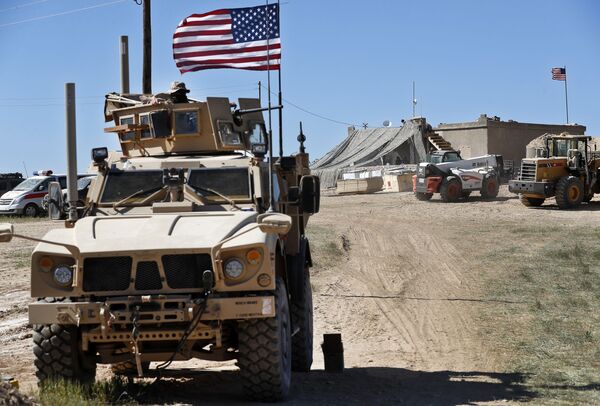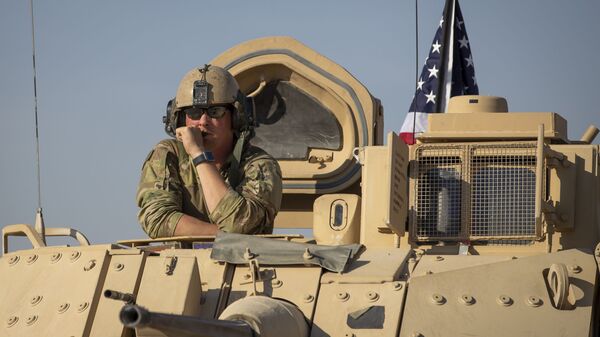The Astana group, a trilateral format comprising Russia, Turkey and Iran created in 2017 to tackle the Syrian crisis, acknowledged on Wednesday that the 5 March 2020 ceasefire deal had facilitated the de-escalation of the situation in Idlib, following Turco-Syrian clashes earlier this year, despite Hayat Tahrir al-Sham's* attempts to obstruct it.
Meanwhile, divisions are growing within jihadi groups in Syria. A week ago, over two dozen militants from Jaysh Maghawir al-Thawra (‘Revolutionary Commando Army’) who were previously deployed in the US-held At-Tanf area surrendered to the Syrian Arab Army. Later, on 20 April, unidentified groups reportedly attacked and destroyed a US military vehicle in Al-Hasakah governorate. At the same time, in Idlib, jihadi militants are deeply split over joint Turkish-Russian patrols on the M4 highway which started on 15 March.
Syrian Militants are Growing Disenchanted With US
"Incidences of discontent and partisan warfare against the illegal US military occupation of east Syria are inevitable and increasing likely in frequency and escalating intensity", says Mark Sleboda, a US military veteran and international affairs and security analyst. "One of the primary reasons for these uprisings is local Arab tribal unhappiness with being governed over by the US' preferred proxies of the Kurdish People's Protection Units (YPG) within the US-organised Syrian Democratic Forces (SDF) brand. Another is the unwillingness of the US to provide sufficient financial and other aid to begin reconstruction of the war-ravaged territory east of the Euphrates or restart economic activity".
Nevertheless, the US has been heavily reinforcing its troops in east Syria in recent months, particularly around Syria's oil fields, the US veteran notes, adding that Washington is "unlikely to easily give away its last card for leverage in forcing regime change in Damascus via political and economic blackmail".
At the same time, the US cannot rely on any of its beaten proxies, as the Syrian Army made its advances over the entire Syrian geography including the Idlib governorate, believes Christopher Assad, a Canada-based political analyst of Syrian origin, stressing that eventually all foreign troops will have to unconditionally withdraw from all Syrian territories, especially those whose presence is illegal.

Jihadists Split Over Russo-Turkish Patrols
Meanwhile, in Idlib, various jihadi factions are divided over Turkey's joint military patrol of the strategic M4 highway running from Latakia to Saraqib, where it intersects with the M5. Al-Monitor cited local sources as saying that Hayat Tahrir al-Sham* and allied militant groups organised sit-in protests to block the M4 road. However, Turkish riot police and Turkish-backed militants eventually dispersed the sit-in.
"There are definite divisions between jihadist groups in Idlib over accepting or not the latest Russian-Turkish ceasefire effort which would see Turkey and its proxies essentially cede control of Idlib south of the crucial M4 highway", says Mark Sleboda. "There are splits between the more directly Turkish proxy National Liberation Front (NLF) and Hayat Tarhir al-Sham or HTS* (recognized as al-Qaeda* in Syria and is the dominant faction controlling most of Idlib) which rejects the ceasefire terms, between hardline and pragmatic factions within HTS itself, and between HTS* and the even more fundamentalist jihadist groups including the Rouse the Believers Operation Room (consisting of Hurras al-Din, Andar al-Din, Ansar al-Tawhid, and Ansar al-Islam), the Guardians of Religions Organisation (GRO), and the largely foreign jihadist formations".
Though Turkey dispersed the protests organised by jihadi provocateurs, Ankara has yet to halt military support or daily supplies to militants in Idlib, argues the US military veteran. He notes that Ankara has taken no action to "disarm or remove the jihadi militants south of the M4 as required by the so-called Sochi 2.0 agreement". Furthermore, these jihadists still continue to launch attacks against Syrian and Russian forces and Syrian government controlled towns and settlements in and around Idlib, he adds.
For the first time Turkish police in Idlib.
— Mughira Al Sharif (@SharifMugh) April 13, 2020
Turkish police deployed to the strategic M4 highway to disperse protesters holding a sit-in against joint Russia-Turkish patrols. pic.twitter.com/DsOC35FzNw
Previously Ankara has repeatedly come under criticism from Moscow and Damascus for not fully observing the 2018 Sochi agreements by failing to separate moderates from radicals in Idlib and disarm them. However this time Turkey appears to demonstrate commitment to the 5 March truce deal, says Ghassan Kadi, a Mideast expert and political analyst of Syrian descent.
"The 5 March 2020 agreement was Erdogan’s last chance to put into practice the terms of all previous agreements he made with Russia over Syria, or face military defeat and humiliation", suggests Kadi, recollecting that the pact's conclusion was preceded by severe clashes between the Turkish troops and the Syrian government forces in Idlib province.
"Let us not forget that the events of the days leading up to the 5 March meeting, Erdogan tried very hard to go there as a victor who would dictate his own terms, but facts on the ground painted him in a corner and put him in the position of one who would be asking for a face-saving deal; and the 5 March agreement was just that".
In this light it is not surprising that Ankara reined in jihadists who were trying to hinder joint Russo-Turkish M4 patrols, echoes Christopher Assad. According to him, the performance of the Syrian forces in Idlib and Russia's resolve to maintain security and order in the region could have convinced Ankara to exert some pressure on militants in Idlib.
Astana Group Successfully Maintains Balance of Interests
Russia, Turkey and Iran have not successfully balanced their interests in Syria following the recent escalation and then "ceasefire" on new lines in Idlib, Sleboda believes, adding that Washington's attempts to woo Turkey amid the Turco-Syrian clashes and alienate it from its Russian and Iranian allies have failed.
"The US has not succeeded in driving a wedge between Moscow and Ankara because both governments despite their conflict with each other in Syria, resent even more the US occupation of east Syria with its proxy Kurdish forces and thus see a common enemy", the US military veteran suggests.
Erdogan’s biggest nightmare is the rise of Kurdish nationalism within Turkey, and his American allies made it clear to him that this is not an issue of concern to them despite his repeated pleas for support, echoes Ghassan Kadi.
"Erdogan's partnership with Russia on the other hand puts the Kurdish issue in the hands of Russia and Syria to deal with", he says. "It is possible that Erdogan has allowed his nationalist interests to come before his religious aspirations of Muslim leadership. After all, he has already tried the latter and failed".
For his part, Christopher Assad, highlights that the war in Syria is still continuing, adding that the US and its Western allies have been waging this war, either openly or covertly, since the 1950s imposing trade, economic and financial sanctions on the country.
"The West in general and the US in particular still hopes against hope to keep Syria weak and prevent her from rebuilding its industrial, scientific, educational, health and urban infrastructures. All Syrians cannot wait to see the rebuilding efforts resume", he says, stressing that despite the US sanction regime, Syria is continuing to move forward to peaceful political settlement.
*Hayat Tahrir al-Sham, al-Qaeda are terrorist groups banned in Russia and other countries.




